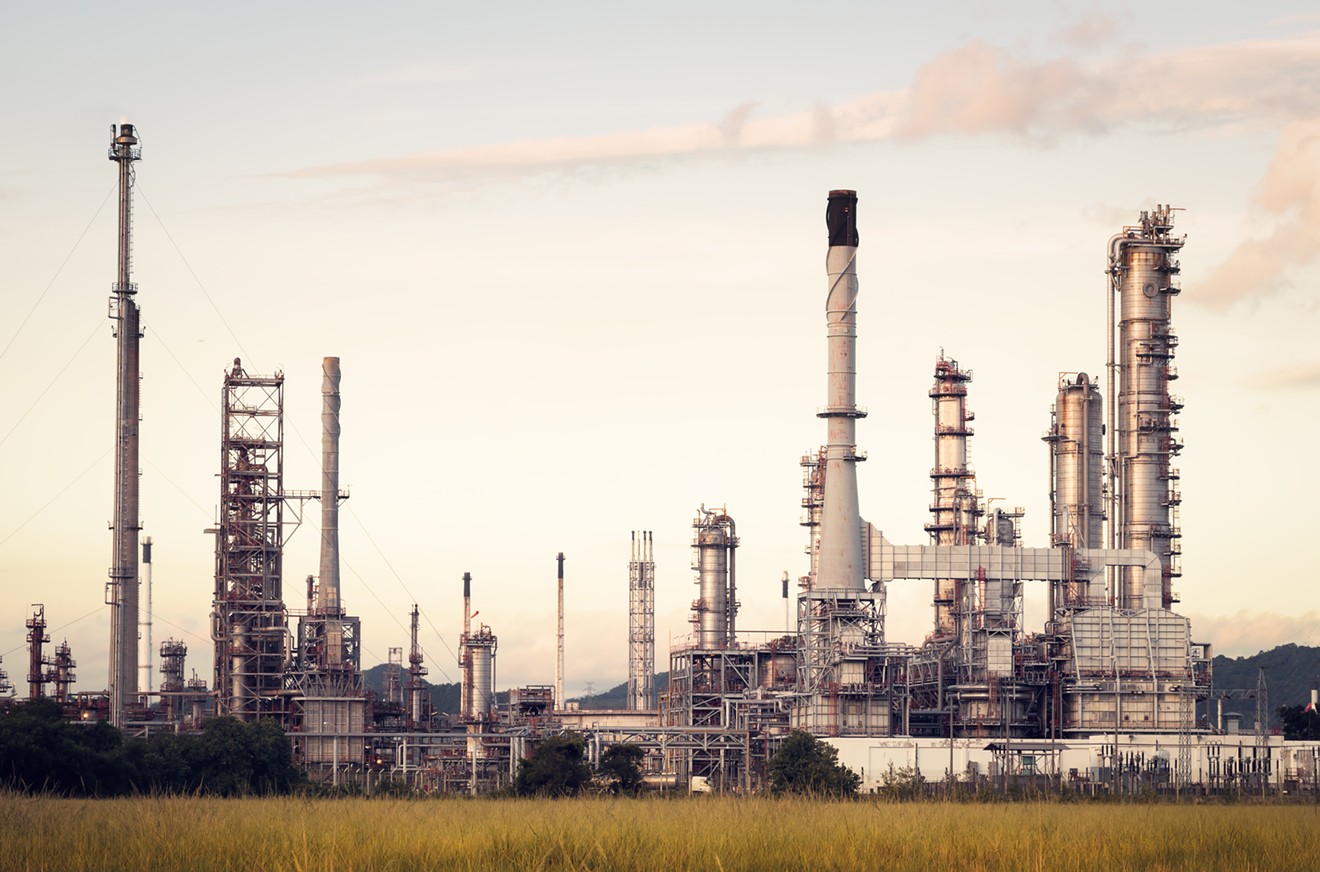Ash fell from the sky in parts of Commerce City last week after a malfunction at the Suncor oil refinery caused thick yellow smoke to spew into the air north of the facility.
Or did “catalyst” impact the area after an “operational upset” resulted in an “opacity event”?
That’s just about all the explanation that residents of Commerce City and north Denver got from Canadian oil giant Suncor Energy as they struggled to understand what had happened in their community last Wednesday, December 11.
Two nearby schools were placed on lockout amid reports of foul odors, unusually poor air quality and yellowish ash coating outdoor surfaces. The company’s statement, posted to its Facebook page hours later, said the substance was “classified as non-hazardous” and offered residents free car washes for their trouble, but did little to clear up the confusion.
“We are left with questions,” Ean Tafoya, co-chair of the Colorado Latino Forum, said in a statement on the incident. “What assurance do we have that this substance is what they say it is? What effect will it have on our waterways and water quality? We must develop a better bilingual system to notify locals when malfunctions cause exposure.”
Like any other large, complex industry, the oil and gas business has a dictionary’s worth of technical jargon and long-established phraseology that’s completely unintelligible to the general public. We’re typically not very interested in understanding how to run a collar lock mandrel downhole on slickline or why paraffins break apart from olefins and naphthenes as a result of fluid catalytic cracking.
But it’s when things go wrong — and the public suddenly wants to know a lot more about what oil and gas companies are getting up to in their backyards — that this language barrier proves especially impenetrable. And, as many journalists, activists and others speculated in the wake of last week’s Suncor incident, maybe that’s the point.
Consider the events in Lochbuie in November 2017, when a loud boom shook houses across the small town north of Denver International Airport, rattling windows and knocking pictures off walls. For two days, residents speculated about the source of the “mystery boom,” until officials with the Colorado Oil and Gas Conservation Commission released a statement explaining that an empty oil tank nearby had experienced an “overpressuring event.”
There’s no record of that phrase ever appearing in a news story, in Colorado or anywhere else, before the Lochbuie incident — probably because an “overpressuring event” is more commonly known as an explosion.
The COGCC’s database of Spill/Release Reports, which oil and gas companies are required to file when certain incidents occur at their facilities, are a gold mine for industry euphemisms.
During routine pipeline maintenance at a site north of Fort Lupton in November, an employee of Occidental Petroleum wrote, “historical petroleum hydrocarbon impacts to the subsurface were encountered.” (They found an oil spill.) In October, Extraction Oil and Gas reported that after crews removed equipment at a tank battery near Windsor Reservoir, “legacy suspected soil impacts were observed.” (Oil had been leaking into the ground for who knows how long.)
There’s no great mystery about the strategy here. “Oil spill” sounds bad; a “historical release” sounds like a Rolling Stones LP. Gas leaks near elementary schools are scary; the “excessive venting” for which the COGCC cited the operator of a site near Erie’s Aspen Ridge Preparatory School in 2017 is just a boring engineering problem.
The way big corporations use language to shape the public response to events like oil spills or refinery malfunctions has long been the subject of academic research. "It is a truism of corporate language that word choice and lexical patterning play a significant role in deflecting attention and downplaying real and potential troubles," writes Richard Alexander, a researcher at the Vienna University of Economics and Business, in a 2013 paper on the response to the Deepwater Horizon oil spill.
In his study of oil giant BP's response to the catastrophe, Alexander analyzed years of press releases and other corporate communications, documenting how words like "tragedy" and "explosion" were quickly supplanted by "incident" and "impacts." In contrast to the notorious Exxon Valdez spill, which Alexander notes is "indelibly linked with Exxon in many people’s memories," BP's use of euphemisms and abstract language in the aftermath of the largest marine oil spill in history may have helped prevent the same from happening to its own public image. "These misrepresentations are coming to be ‘normalized,'" he writes. "They have become standard practice."
In the case of last week's Suncor incident, the company's initial statement described the "catalyst" that had been emitted as "a clay-like material that is classified as non-hazardous." While that may be technically true, a follow-up statement released by Suncor at 6:40 p.m. on Friday, December 13, served as a reminder of the reality that can lie behind carefully crafted corporate language.
In fact, the catalyst — a term for a mixture of aluminum oxide, aluminum phosphate, kaolin and silica — is rated as a slight health hazard under the National Fire Protection Association Hazard Identification System, according to documents released by Suncor.
"It is possible that exposure to airborne catalyst particles may have caused short-term discomfort to eyes, and coughing and wheezing, particularly in sensitive individuals," Suncor's second statement said.
[
{
"name": "Air - MediumRectangle - Inline Content - Mobile Display Size",
"component": "12017618",
"insertPoint": "2",
"requiredCountToDisplay": "2"
},{
"name": "Editor Picks",
"component": "17242653",
"insertPoint": "4",
"requiredCountToDisplay": "1"
},{
"name": "Inline Links",
"component": "18838239",
"insertPoint": "8th",
"startingPoint": 8,
"requiredCountToDisplay": "7",
"maxInsertions": 25
},{
"name": "Air - MediumRectangle - Combo - Inline Content",
"component": "17261320",
"insertPoint": "8th",
"startingPoint": 8,
"requiredCountToDisplay": "7",
"maxInsertions": 25
},{
"name": "Inline Links",
"component": "18838239",
"insertPoint": "8th",
"startingPoint": 12,
"requiredCountToDisplay": "11",
"maxInsertions": 25
},{
"name": "Air - Leaderboard Tower - Combo - Inline Content",
"component": "17261321",
"insertPoint": "8th",
"startingPoint": 12,
"requiredCountToDisplay": "11",
"maxInsertions": 25
}
]












